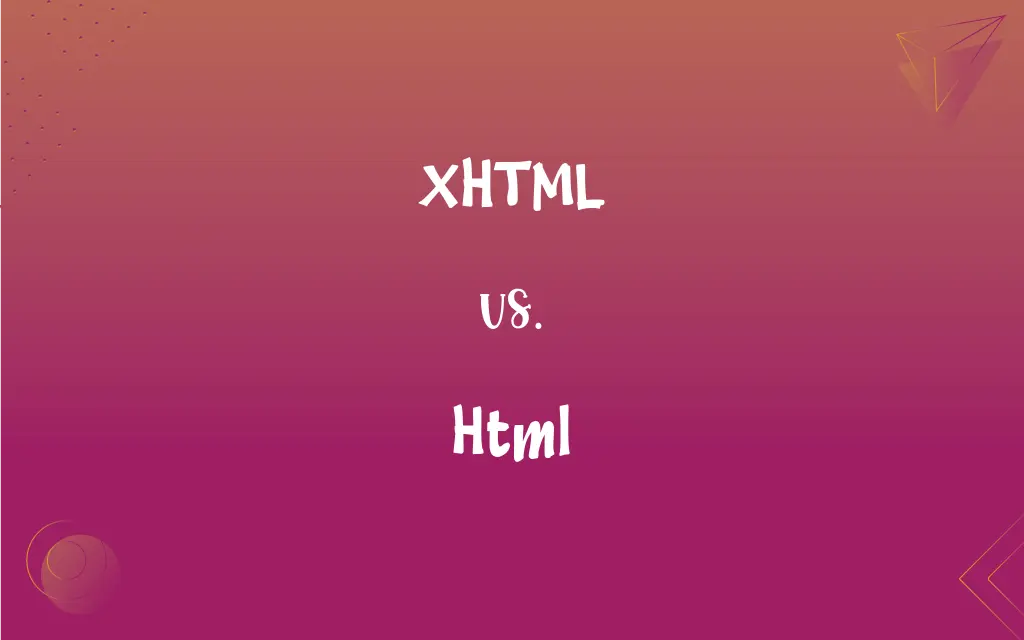XHTML vs. HTML: What's the Difference?
Edited by Aimie Carlson || By Harlon Moss || Updated on October 20, 2023
XHTML is a stricter and XML-based version of HTML; HTML is a standard markup language for creating web pages.

Key Differences
XHTML, standing for Extensible Hypertext Markup Language, is a reformulation of HTML as an XML application, thus making it more strict. HTML, or Hypertext Markup Language, is the standard markup language that has been used to create web pages since the beginning of the World Wide Web.
Both XHTML and HTML allow for the structuring of web content. However, XHTML mandates web developers to adhere to stricter syntax rules, making it more predictable in behavior. HTML, being more forgiving, allows for slight deviations or errors in code, which might lead to unexpected behavior in some browsers.
XHTML's adherence to XML standards means that it supports namespaces, facilitating the integration of other XML-based languages. In contrast, HTML does not naturally support this feature and was primarily designed to describe the structure and presentation of web content.
Another stark difference lies in error handling. In XHTML, even a minor error can prevent a page from being displayed, enforcing cleaner coding practices. With HTML, browsers often display the page by making assumptions about what the developer intended, leading to potential inconsistencies across browsers.
While both XHTML and HTML aim to structure and present content on the web, their use cases have evolved over time. XHTML was favored for a while for its XML advantages, especially in XML-dominated environments. However, HTML, especially with the introduction of HTML5, has reclaimed its position as the dominant markup language for the broader web due to its flexibility and evolution.
ADVERTISEMENT
Comparison Chart
Base Language
XML-based
SGML-based (originally)
Syntax Strictness
Strict
Forgiving
Support for XML Namespaces
Yes
No
Error Handling
Rigid (minor error can prevent page display)
Flexible (browsers compensate for minor errors)
Evolution & Usage
Initially favored for XML advantages
Dominant, especially with the advent of HTML5
ADVERTISEMENT
XHTML and HTML Definitions
XHTML
XHTML mandates precise syntax adherence.
Due to its strictness, XHTML demands proper closing of all tags.
Html
HTML structures and presents web content.
Using HTML, he styled the content to make it visually appealing.
XHTML
XHTML is an application of XML for web content.
Combining XML's strictness with web structuring, XHTML was introduced.
Html
HTML is a markup language for creating web pages.
She learned HTML to start building her own website.
XHTML
XHTML is a stricter version of HTML based on XML.
To ensure compatibility, she switched to XHTML for her project.
Html
HTML has evolved over time, especially with the introduction of HTML5.
The introduction of HTML5 brought new features and capabilities to web design.
XHTML
XHTML supports XML namespaces.
The use of namespaces in XHTML allowed for more structured data representation.
Html
HTML allows for more flexibility in coding compared to XHTML.
Even with some coding errors, the HTML page displayed correctly.
XHTML
XHTML requires cleaner coding practices due to rigid error handling.
He had to thoroughly debug the XHTML code before deploying the website.
Html
HTML does not naturally support XML namespaces.
For simpler web projects, he preferred HTML without the complexities of namespaces.
Html
A markup language used to structure text and multimedia documents and to set up hypertext links between documents, used extensively on the World Wide Web.
Html
A set of tags and rules (conforming to SGML) for using them in developing hypertext documents
FAQs
How do browsers handle errors in HTML?
Browsers often compensate for minor errors in HTML, displaying the page with assumptions.
Do I need to close all tags in XHTML?
Yes, XHTML requires proper closing of all tags due to its strict syntax.
How does HTML differ from XHTML in its base?
While HTML originally derived from SGML, XHTML is based on XML.
Why was XHTML introduced?
XHTML was introduced to bring the strictness of XML to web content structuring.
What does XHTML stand for?
XHTML stands for Extensible Hypertext Markup Language.
Is XHTML more strict than HTML?
Yes, XHTML has stricter syntax rules compared to HTML.
Has HTML evolved over the years?
Yes, especially with the advent of HTML5, which added new features and capabilities.
Is XHTML still widely used?
While XHTML had its era of popularity, HTML, especially HTML5, is more widely used today.
Are all XHTML documents valid XML?
Yes, XHTML documents adhere to XML rules and are therefore valid XML.
Can I use CSS with XHTML and HTML?
Yes, both XHTML and HTML support styling with CSS.
Can you integrate other XML-based languages with XHTML?
Yes, XHTML supports XML namespaces, facilitating such integrations.
Which is more forgiving in terms of coding errors, XHTML or HTML?
HTML is more forgiving and allows for slight deviations or errors.
Can I use JavaScript with both XHTML and HTML?
Yes, both XHTML and HTML support JavaScript integration.
Why might one choose XHTML over HTML?
Some might choose XHTML for its XML advantages, especially in XML-dominated environments.
Is it easier to learn HTML or XHTML for beginners?
Most beginners find HTML easier due to its more forgiving nature.
How do I convert an HTML document to XHTML?
To convert, one must ensure adherence to strict XHTML syntax rules, like closing all tags.
What's the primary benefit of XHTML's strictness?
XHTML's strictness ensures more predictable behavior and compatibility across platforms.
Which is better for SEO, XHTML or HTML?
Both can be optimized for SEO, but modern practices often lean towards HTML, especially HTML5.
Is HTML5 the latest version of HTML?
As of my last update in January 2022, HTML5 is the latest major version.
Does XHTML support multimedia elements?
Yes, XHTML supports multimedia elements, but HTML5 offers a broader range of such features.
About Author
Written by
Harlon MossHarlon is a seasoned quality moderator and accomplished content writer for Difference Wiki. An alumnus of the prestigious University of California, he earned his degree in Computer Science. Leveraging his academic background, Harlon brings a meticulous and informed perspective to his work, ensuring content accuracy and excellence.
Edited by
Aimie CarlsonAimie Carlson, holding a master's degree in English literature, is a fervent English language enthusiast. She lends her writing talents to Difference Wiki, a prominent website that specializes in comparisons, offering readers insightful analyses that both captivate and inform.































































